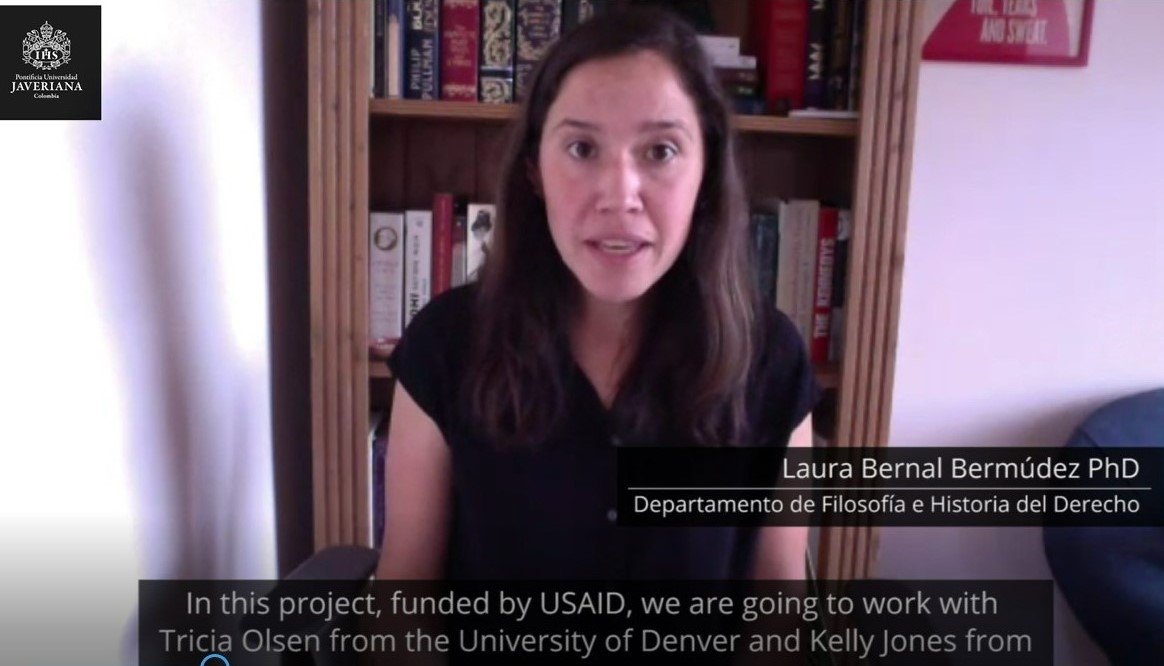Cycle 9 (2020 Deadline)
Inclusive economic growth for sustainable peace? Assessing development mechanisms and conservation efforts in post-conflict Colombia
PI: Laura Bernal-Bermúdez (laurabernal@javeriana.edu.co), Pontificia Universidad Javeriana
U.S. Partner: Tricia Olsen, University of Denver
Project Dates: April 2021 - April 2023
Project Overview
 | | PEER Project PI Laura Bernal-Bermúdez, PhD, explains the concept of the project |
Scholars have sought to understand the impact of peace projects in territories affected by violence, poverty, and inequality, but the evidence base remains weak. This project sought to understand which development pathways are most capable of fostering enduring peace, building inclusive rural development, and promoting environmental sustainability in regions affected by conflict, inequality, and poverty. Using data from Colombia, this project explored the impacts of two development programs: one empowering the private sector (Zones Most Affected by the Armed Conflict, or ZOMAC in Spanish) and one empowering local communities (Development Programs with a Territorial Focus, or PDET in Spanish). Systematic analysis is needed to identify which mechanisms—or combinations of mechanisms—are most effective and where tradeoffs in outcomes may occur. The team’s mixed-methods approach provided technical assistance to both public and private institutions in Colombia to promote enduring peace, inclusive development, and environmental sustainability.
This study leveraged differences in these interventions to establish a rigorous evaluation and conduct policy-relevant research and shed light on the environmental footprint of these initiatives. The team also conducted four qualitative case studies to provide contextual evidence for their quantitative findings.
Final Summary of Project Activities
During the two-year project, the team undertook research and impact activities to understand and inform the implementation and evolution of two peace and development programs (PDET and ZOMAC) that were designed as a result of the 2016 Peace Agreement with the largest guerrilla group in the country, the FARC-EP. The project team contributed to the evaluation of these programs by building a novel and comprehensive dataset to measure the impact of these programs, as well as models to test for impact.
The researchers also selected four case studies for in-depth research in communities that have received different levels of intervention. Campohermoso (Boyacá) had very similar socioeconomic and violence indicators as some of the PDET municipalities, but it did not receive any intervention because it fell short from the threshold established. Tauramena (Casanare) is a ZOMAC-only municipality. Zambrano (Bolívar) is a PDET municipality with participatory processes and low levels of investment in development projects funded by companies, state entities, or cooperation agencies. El Bagre (Antioquia), now engulfed by high levels of violence because of policies of the new government against illegal mining, is a PDET municipality with high levels of investment of state entities and companies in development projects.
Among their findings were the perception by the communities that after a highly participatory design stage, the implementation stage was appropriated by politicians and technocrats in the capital or at the regional level. Other perceptions identified included low levels of transparency in resource allocation, economic projects that were meant to empower local actors and local economies being rarely funded, conservation policies not being included in the PDET program, and little containment of drug trafficking, which has resulted in increased violence in the territories.
Through mixed methods research, the team developed two policy outputs: a summary with recommendations for policy makers in Colombia (in Spanish), and a policy document in Spanish, English, and French to inform the experiences with peace and development in Colombia and in other countries (see links below).
During the course of the project, the researchers established partnerships with other academics in Colombia working on the PDET programs and held an official meeting to discuss their findings with the Agency for the Renovation of the Territory. They also hosted an impact event with 33 attendees from companies, civil society organizations, cooperation agencies, state entities, and academia, where they shared their findings, received feedback, and used a participatory methodology to co-create recommendations to improve the PDET program and the Works for Taxes program.
The project supported the research of a doctoral student, and Laura Bernal-Bermúdez, the original PI of the project, worked on the design of a course for undergraduate students on Peace-Building and Development.
Back to PEER Cycle 9 Grant Recipients
| 



